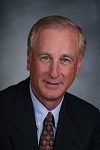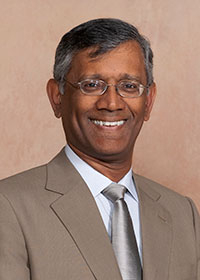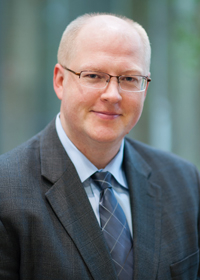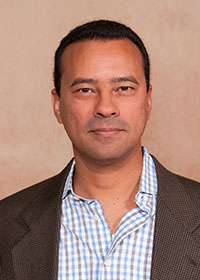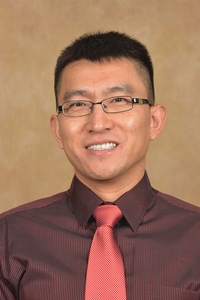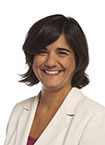Spring 2013
Letter from the Director
"If we knew what it was we were doing, it would not be called research, would it?"
-Albert Einstein
The Institute for Research in Marketing is proud to have a prestigious group of board members representing some of the greatest brands across many key industries in America. These brands represent billions of dollars of brand equity, enabling our board member organizations to sustain competitive advantage and leadership in their respective industries.
One common asset shared by these great companies is innovative, marketing research-based cultures. They have built sustainable brand equity through a deep understanding of the unique brand associations in their customers' minds.
Linking our extraordinary academic research professors with our Institute board members has long been the goal of the Institute and a success for those involved. As one historical example illustrates, Professors Deborah Roedder John and Barbara Loken, along with their co-authors and support from Institute board members, explored the significance and importance of relationships between brand associations in developing brand equity in their classic Journal of Marketing Research article in November 2006:
"Understanding brand equity involves identifying the network of strong, favorable, and unique brand associations in memory. This article introduces a methodology, Brand Concept Maps, for eliciting brand association networks (maps) from consumers and aggregating individual maps into a consensus map of the brand. Consensus brand maps include the core brand associations that define the brand's image and show which brand associations are linked directly to the brand, which associations are linked indirectly to the brand, and which associations are grouped together."
Our board is our strength and provides a conduit between their corporate research needs and our faculty.
Our Vision and Mission for the Institute Board continues to be the following:
The Institute for Research in Marketing leverages the expertise of the Carlson School's world-class marketing faculty and an advisory board of practitioners from leading corporations to foster rigorous and relevant research that improves the science and practice of marketing.
Through its many initiatives, the Institute provides a forum for dialogue among marketing scholars, industry practitioners, policymakers, and students.
Fostering joint research projects that deliver value to our practitioner Institute partners and our faculty should be our long-term goal.
Our marketing professors continue to be extremely productive in their research, which is reported on a worldwide basis with the help of the Institute. This coverage enhances the brand image of each faculty member, our corporate members, and the name of the Carlson School of Management and the Carlson Marketing Department.
This faculty research is regularly updated on our Institute website and is more accessible due to enhanced search capabilities on the publications page. Another improvement is the expertise page, which is categorized by topical areas, making it easy to search for faculty expertise. This progress is due to Institute Program Coordinator Ashley Dziuk's efforts to provide greater access to and awareness of our faculty research.
| Bloomberg Businessweek Chicago Tribune Daily Mail Forbes Fox News Health magazine Huffington Post (globally) KARE-11 Miami Herald |
MinnPost Minneapolis St. Paul Business Journal Minnesota Daily MSN (globally) Pioneer Press Psychological Science Psychology Today Star Tribune the Atlantic |
The Baltimore Sun The Miami Herald The Seattle Times TIME United Press International US News Wall Street Journal WCCO CBS Minnesota Yahoo! (globally) |
| Adevarul (Romania) APS Australian Broker Balsas (Lithuania) Bio-Medicine Business Insider Business Standard |
Detik Health (Indonesia) Dirigentes (Spain) Health Day La Lettura Medical Xpress Men's Health (Malaysia) Neuromarketing |
Science Daily Science Newsline The Dallas Morning News The Economic Times The Globe and Mail The Indian Express yee yan magazine |
Our faculty has also been recognized in the past six months with the following awards:
Professor George John and co-author Mrinal Ghosh (University of Arizona) have been awarded the 2013 Louis W. Stern Award by the American Marketing Association Foundation (AMAF).
The award recognizes an outstanding article in a widely recognized and highly respected refereed journal which has made a significant contribution to the literature on marketing and channels distribution.
Associate Professor Vladas Griskevicius was awarded the Early Career Award from the Society for Consumer Psychology (SCP).'
This award is given to honor a psychologist who is no more than eight years post-PhD who has made significant scientific contributions to consumer psychology. Griskevicius was presented the award at the SCP conference in San Antonio in early March.
In closing, our faculty continues to advance the practice of marketing in the context of a global economy with increasing technological and social change. To do this, the Carlson School must be a leader in the development of knowledge valued by the marketing profession and in the dissemination of this knowledge to students, practitioners, and academia.
Thank you to all of our faculty and Institute members for their dedication, continued support, and engagement. Continued best wishes and success to you in 2013!!
Best wishes,
Wayne G. Mueller
Director, Institute for Research in Marketing
Highlighted Media Coverage of Faculty Research
Locating Research in Marketing within a World-class University
George John |
EDUCATIONPhD, 1981Marketing MBA, 1976University of Illinois at Urbana-Champaign B Tech, 1974Aeronautical Engineering |
How students benefit from research at the Carlson School
Research in marketing is much more varied than it was even 20 years ago. To stay current, Associate Dean George John explains the evolution in his own work, as well as the challenges and successes of the Marketing Department in maintaining its position as a world-class group.
"One of the biggest challenges we face here is simply keeping up with the growth and variety of research that’s done," John said. "It's a bit like Noah's Ark - you need two of every kind to get anywhere."
A small department can still be excellent at teaching, but not at research. Twenty-five years ago, most world-class marketing departments were a dozen people. Today, it's more like two dozen.
And despite his duties as associate dean, John is always one of those researchers. While the specific topics and methods may change, his research in marketing channels is constant.
"The challenge as associate dean is to combine the short, meeting-after-meeting workload of being an administrator with the more time-consuming, longer horizon process of being a researcher," John said.
Meeting that challenge over the last four years, John, his colleagues, and doctoral students have been conducting field experiments concerning pay for performance. For example, Schwan's, an Institute for Research in Marketing (IRM) board company, collaborated with department faculty to implement an experiment that changed the compensation structure of its frozen foods salespeople.
The researchers also conducted two other field experiments. At a pharmaceutical company overseas, the team implemented an experiment that changed sales reps' pay structure from emphasizing bonuses tied to target levels to emphasizing a more continuous commission-like structure. The results were striking. Commissions are much better for motivating effort to produce immediate sales, but bonus-weighted plans are better for guiding long-term sales goals. This study was recently accepted for publication in the prestigious Journal of Marketing Research and the other two studies are in the process of being sent out to journals.
Field experiments like these are very difficult to organize because they require close collaboration with a company. But when successful, they produce a much stronger basis for making conclusions about what is happening.
"I know for sure that these experiments would never have happened if we didn't have IRM and our connection to Schwan's," John said. "Likewise, the connections to the other two companies that allowed us to do these experiments were vital."
John and his team also developed novel techniques from a methodology standpoint. They used advanced econometric procedures to extrapolate the actual results to settings and compensation structures that were not tested in the study. So if an experiment tested two specific pay plans, these techniques allow the company to see what would happen if they chose something in-between.
"Some of the techniques we're using are so cutting edge that they're not even found in the published literature yet," John said.
Carlson School marketing students are learning these techniques and tools not just from the Marketing Department, but also from the economics, statistics, and psychology departments. It's a phenomenon that's unique to American higher education because many business schools around the world aren't connected to a comprehensive university. The London Business School is very prominent, but it doesn't have a university like the U of M standing behind it. Its students do not have the advantage that Carlson School students have - studying and learning these new techniques and methods across different departments.
"That's what makes our research exciting and interesting, that's what keeps us fresh, that's what keeps us unique, and that really is our key differentiator," John said. "It's the main reason why people from throughout the world come to the University of Minnesota and ask, 'What do you guys think of this?'"
Aside from agriculture, the United States has one prominent industry with a persistent trade surplus - higher education. People all over the world want to come and take advantage of the U.S. higher education system because, despite its faults, it's still the best in the world. What makes it best is its unique combination of commitment to research and teaching within the same institution. In order to carry out any of the studies John did, he needed collaboration with an industry partner. In contrast, there are many government-funded specialized research institutions overseas, along with a lot of colleges and universities that solely focus on teaching.
"Standing up and teaching for 30 years can be humdrum," John said. "There's no energy, there's nothing new you are developing, so combining research and teaching is an American phenomenon. And working closely with our constituents, meaning businesses, is a uniquely land-grant university mission, which is distinctively American. So we're totally unique in the world. I don't think you'll find another campus like this."
A Truly Global Economy
Carlos Torelli |
EDUCATIONPhD, 2007Marketing MBA, 1997Marketing Master in Business Engineering, 1993Finance Bachelor of Civil Engineering, 1986Andres Bello Catholic University |
The new era of merging cultural meanings and culturally savvy generations
In the U.S. business community, cultural and international issues are important, but they're often not a high priority. Businesses here are still comfortable with the notion that "global" means the United States and Western Europe. But companies from all over the world are starting to sell everything, everywhere.
By teaching around the world, including in the China Executive MBA program (CHEMBA), Associate Professor Carlos Torelli stays connected with colleagues on that side of the world and abreast of the priorities in their business communities. In Asia, international business issues are important and invested in, because that's where its future is. In the past it manufactured items that others designed. But many countries, particularly China, now want to move to the next step of creating their own brands. They're starting to see the economic benefits.
"China is investing very heavily in attracting talent and talent is going to that part of the world," Torelli said. "I think the world is realizing that global competition is truly a global competition."
Take for example the growth of Corona in the United States. Heineken used to be the main imported beer brand, but now imports like Corona are becoming mainstream. Add the fact that the cultural boundaries of branding are being erased, and you see these new components of globalization. Brands like Budweiser are a joint venture now - is it an American brand or a Belgian brand?
"I strongly believe that's the big issue for the next few years. It's not so much streamlining manufacturing; it's learning to operate in a globalized economy in which everything is dynamic and fluid," Torelli said. "Where the brand is headquartered might be less important than where its biggest markets are, and what connections the brand has developed in those markets."
While these specific issues don't pose immediate threats for established brands, they do pose mid- and long-term threats. Consumers' responses to these new trends in globalization are key. How do they react to the cultural meanings - and sometimes conflicting cultural meanings - in products? Marketers need to understand when those meanings work for them or when they could threaten their business.
"Around the world there is more awareness that these are pressing issues that we're going to have to deal with," Torelli said. "Globalization merges meanings - it's turning the market into a multicultural space - in which meanings from many different regions of the world are kind of juxtaposed in a single offer."
Most students at the Carlson School have international experience, far beyond going to Cancun for spring break. And their cultural awareness is greater than many in the business community.
"The kids in my class love when I talk about [globalization]. They love that more than anything else, because they live it, they understand it, they see it, and they see the gap with what they see around them in terms of the issues, the opportunities, and the risks," Torelli said. "They can take sides and put themselves in a different cultural frame."
Newer generations will be even more culturally savvy. There's a whole generation in the United States growing up in immersion programs. That's common in Europe and some parts of Canada, which is why many of the companies from those parts of the world are very attune to cultural differences. They are at the forefront of all these globalization issues.
"So the whole idea of ethnic marketing is kind of a little bit blurred now - because who is ethnic?" Torelli asked.
Bi-culturals are not only immigrants or their children, but people who have extended knowledge about another culture through the Internet, friends, or society. That's becoming more the norm than the exception. Younger generations are becoming increasingly culturally diverse, not only because of heritage but also from exposure. And they're not on the radar of any marketer in that respect because while they might be ethnically Caucasian, they are definitely more multi-cultural.
Currently working on a book to put these very important issues into lay language for practitioners, Torelli is trying to extend the reach of his research. The Carlson School is in a big city, surrounded by big companies. There is a need for greater distribution of easily understood knowledge to the business community.
Through Executive Education, different Carlson School classes, and consumer- and business-oriented publications, there's an excellent chance to educate Twin Cities companies about the opportunities that can open when they better understand global issues and how this knowledge can be used to protect and grow their brands.
"Our research first touches our colleagues, but the ultimate beneficiary is society - companies, government, consumers, and the public," Torelli said. "I'm firmly committed to strengthening our Executive Education capabilities. Reaching out to companies is another way to disseminate knowledge and help them with the real issues they face."
International and Executive Education
Tony Cui |
EDUCATIONPhD, 2005Managerial Science And Applied Economics MA, 2002Operations And Information Management IMBA, 2000International Business B. Eng., 1998Industrial Engineering B. Eng., 1998Fluid Machinery And Fluid Eng. |
Incorporating the growing importance of emerging markets
With every international experience, Associate Professor Tony Haitao Cui expands not only his research avenues, but also the expertise he brings into the classroom. His main research domain is quantitative and behavioral modeling in marketing, applying theories and findings to solve specific marketing problems. International experiences give Cui additional insights, allowing him to do groundbreaking research.
Right now Cui is studying the effect of fairness and culture on managerial decision making. Do decision makers in different cultural environments make decisions similarly or differently? What factors are they considering when making those decisions - is it just money or additional factors like fairness, the environment, and/or power?
Cui is looking forward to putting more effort into research on the emerging market, given its growing importance, particularly in Brazil, Russia, India, China, and South Africa (BRICS). In the emerging market, new practices occur every day, which means there might be new phenomena - new marketing examples that could be brought into the classroom to help students learn important insights that are invaluable for their future careers. Thus, expertise in emerging markets helps Cui excel in teaching.
When Cui teaches students in the Carlson China Executive MBA program (CHEMBA), he has two goals. The first is to incorporate cutting-edge theories into his lectures and the second is to apply his experience and insights about emerging markets into his teaching.
The students, mostly mid- and high-level executives from Chinese or multi-national companies, bring lots of experience into the classroom. They aren't attending to listen to and accept every word the instructor says; they’re coming to class to learn new insights that may help them solve a real business dilemma.
"Interactions with them are really rewarding," Cui said. "It's a fun experience and it helps me understand more about international consumers and how to run businesses in international markets. It's a really nice opportunity the Carlson School is offering its faculty and I’m very happy to take advantage of that."
Cui also teaches the Global Practicum in Northern China MBA course. Carlson School MBA students, with Cui's supervision, are essentially consultants for companies. The companies are interested in the international market and usually want to enter it, launch new products there, or improve their service in emerging markets like China. It's a unique program that offers excellent value to the companies as well. And working with well-respected U.S. companies every year (including Best Buy, Dairy Queen, Hormel, Mosaic, Polaroid, and Thomson Reuters) is fascinating for Cui.
"It's a very new environment for students and it might even be overwhelming, but you learn the most when you are facing challenges," Cui said. "We try to push students to jump out of their comfort zone so they face more challenges and learn how to solve problems. It's another program that I really enjoy teaching."
Most Carlson School students have never been to China, and some have never been overseas. This program is valuable for their future careers, especially in an era of globalization. Wherever they are working in the future, eventually they are going to talk about insourcing from China, selling something to Indian consumers, or interacting in some way with the international market. This program prepares them to do business in overseas markets and to work with international teams. Regardless if their business is done remotely, knowing the different norms and expectations is essential.
Students also learn to be more open-minded. They know the U.S. market is the biggest in the world, but clearly it's not the only one. If they want to enter international markets, it's important to know that the rules and ways of operating could be very different.
Cui’s involvement in teaching executive programs at the Carlson School helps him to further contribute to not only the Chinese business community, but more importantly to the U.S. business community. For example, Cui recently taught a seminar for Datacard Group. It was a full-day program, and involved teaching the executives from the company both how to do business and marketing in China and the general management and design of distribution channels in the international market. The feedback from the executives was encouraging. They said the lecture was insightful and helpful for them to better understand and to be well-prepared for entering the emerging markets that are the company’s next strategic targets for expansion. Cui has taught other programs with similar feedback.
"I think that shows the value for faculty to be involved in some international programs, experiences, or exchange opportunities," Cui said. "You are not only teaching them, you're also learning from the audience, from the market. That's really a nice part about being involved with not only the local programs, but also the international programs."
The Rational Animal
A new book by Associate Professor Vladas Griskevicius
Why do three out of four professional football players go bankrupt? How can inhabitants of the Amazonian jungle pass a test that tricks Harvard students? And why do billionaires work so hard - only to give their hard-earned money away?
When it comes to making decisions, the classic view is that humans are eminently rational. Yet growing evidence suggests instead that our choices are often irrational, biased, and occasionally even moronic. Which view is right - or is there another possibility?
In this animated tour of the inner workings of the mind, Associate Professor Vladas Griskevicius and psychologist Douglas T. Kenrick present a radical alternative to prevailing models of decision making. They show that whether we're investing money or choosing a job, buying a car or choosing a romantic partner, our choices are driven by competing evolutionary goals. Although it feels as if there is one single "self" inside your head, your mind actually contains several different ancestral subselves, each one steering you in a different direction when it takes its turn at the controls. By explaining which subself dominates in any given situation, Kenrick and Griskevicius reveal that under our seemingly foolish tendencies is an exceptionally wise system of decision making.
An entertaining, authoritative exploration of our multiple minds, The Rational Animal will transform how we think about decision making - and ourselves. And along the way, you'll discover that while our brains still house caveman impulses, we have evolved to be smarter than we think.
Watch Griskevicius discussing the book!
New Advisory Board Member
|
Shadee Kazemi Carlson
Shadee is the Director of Marketing Business Intelligence at Target Corporation. The marketing business intelligence team delivers insights and analytics to activate better marketing decisions and measures marketing health. Kazemi Carlson has also led teams in guest insights and merchandising at Target, and was formerly in Accenture's retail consulting practice. |
ADVISORY BOARD ACADEMIC REPRESENTATIVE
David Hopkins
George John
Akshay Rao
INSTITUTE STAFF
Wayne G. Mueller Director
Ashley F. Dziuk Program Coordinator
Advisory Board Members
Thank you for your continued support of the Institute for Research in Marketing.
|
Dave Euson G & K Services |
David Kristal Augeo |
Steve Audette General Mills |
Brent Sherwin The Schwann Food Company |
|
David Kadrie 3M |
Julie Moore Ecolab |
David Mucha United Healthcare |
Shadee Kazemi-Carlson Target |
|
Michael Jonikas Polaris |
Kari Kaytor Best Buy |
Paul Hillen Cargill |
James S. Henney Wells Fargo |
